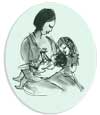|
|
|||||||||||||||||||||||||||||||||||||||||||||||||||||||||||||
|
|
|
||||||||||||||||||||||||||||||||||||||||||||||||||||||||||||
 |
Emergency
Planning Tips If You're Pregnant or Have
Young Children If you are pregnant or someone with infants or young children, find out how to plan for an emergency or disaster. |
 |
Prevalence of Self-Reported Postpartum Depressive
Symptoms 17 States, 2004–2005 Postpartum depression (PPD) affects 10%–15% of mothers within the first year after giving birth. Younger mothers and those experiencing partner-related stress or physical abuse might be more likely to develop PPD. |
 |
Fourteenth
Annual Maternal and Child Health Epidemiology Conference:
Call for Abstracts December 10–12, 2008 Crowne Plaza Hotel - Atlanta Perimeter at Ravinia Atlanta, Georgia |
 |
2005
Fertility Clinic Success Rates and National Summary The 2005 is the most recent report of pregnancy success rates is the eleventh report to be issued under the Fertility Clinic Success Rate and Certification Act. The report includes a national overview that uses information from 422 U.S. fertility clinics. |
 |
Pregnant? Don't Smoke: Learn Why and How to Quit for Good Quitting smoking can be hard, but it is one of the best ways a woman can protect herself and her baby's health. For free help, call 1-800-QUIT-NOW (1-800-784-8669). |
|
|
Depression During and After Pregnancy: A Resource for Women, Their
Families, and Friends A new booklet on perinatal depression released by the Health Resources and Services Administration (HRSA) contains tips on identifying the condition in mothers and offers six steps to help treat it successfully. Perinatal depression includes a broad range of physical and emotional symptoms that many women face during pregnancy or within a year following the birth of a child |
|
Wildfires: Information for Pregnant Women and Parents of
Young Infants |
|
|
Men Seek Infertility Services and varicocele (5.9%). Anderson JE, Farr SL, Jamieson DJ, Warner L, and Macaluso M. Infertility services reported by men in the United States: national survey data. Fertility and Sterility 2008. [Epub ahead of print] |
|
|
* |
Links to non-Federal organizations found at this site are provided solely as a service to our users. These links do not constitute an endorsement of these organizations or their programs by CDC or the Federal Government, and none should be inferred. The CDC is not responsible for the content of the individual organization Web pages found at these links. |
|
|
|
To learn more about PDF
|
|
|
||||||||||||
|
|
||||||||||||
|
||||||||||||
|
|
||||||||||||
|
|
|
|
|
|
|
PRAMS A surveillance project of CDC and state health departments. PRAMS collects state-specific, population-based data on maternal attitudes and experiences prior to, during and immediately following pregnancy.
|
|
|
|
|
|
|
|
|
|
|
| CDC/DRH 4770 Buford Hwy, NE MS K-20 Atlanta, GA 30341-3717 Call: 1 (800) CDC-INFO |
|
|
|
|
|
|
|
|
|
||||||||||||
|